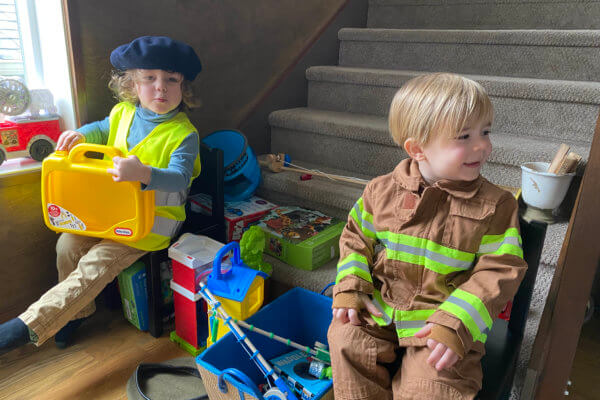Three Superpowers When Your Nanny Child Isn’t Listening
One of the most common questions I see on nanny and parenting forums is, “What do I do when my kid won’t listen?” We’ve all been there! It’s challenging and can be embarrassing when your nanny charge simply will not listen to what you’re asking them to do, especially because we are professionals. Thanks to Positive Discipline, I have three strategies that consistently work. They work so well for me, I’ve come to think of them as my three superpowers for those sticky situations.

Regulate Your Emotions First
Here’s one thing I can promise you. Getting frustrated, louder, or angry just isn’t going to help the situation or win any cooperation from the children in your care. When a child isn’t listening to what you’re asking or telling them, pause for a moment, even if you’re in a rush, and take a breath. Take a couple. I know, I know, I feel the eyes rolling on this one, but it’s truly so powerful. Remind yourself that they are little and that you’re the adult here! Not only will you feel better, but now we’re modeling and teaching them how to handle big emotions too. We don’t want to teach children to yell or get angry the moment someone isn’t complying with their desires, so why would we model that? Consider finding a positive, calming phrase or mantra that resonates with you. I love this one:
“I am the peace. I bring the peace. I share my peace. Peace starts with me.”
Or I remind myself, “choose kindness, choose kindness.”
Validation & Storytelling
Once you’re feeling calm, try to win cooperation by validating and storytelling. This is particularly helpful in those moments when they are on the “Noooo! I won’t!”, loop, especially when you’re making a completely reasonable request. We’ve all had children who won’t put on shoes, won’t leave the park, won’t use the restroom, etc. Try coming in close and quiet, and let them know what you hear.
Adult: “You really don’t want to put your boots on. You’re telling me you’re never going to put your boots on!”
Child: “I won’t!”
Adult: “It must be really hard to stop coloring to put your boots on when we’re having so much fun.”
Child: “Yeah! I’m never putting them on!”
Add some storytelling and let them know you get it. I don’t get too overly exaggerated when I do this, but I do put a little extra oomph into it, so they know I hear how hard it is.
Adult: “We have to stop coloring, and we’re having so much fun! You’re using your bright orange marker on the fish, and you’re not done yet. Now we have to go put on our boots and get in the car. You have to be in the car seat, and you already had to sit in the car for a long time this morning when we dropped your sister off. Now it’s already time to pick her up. We’re having a busy day, and you want some more time to be together and color. It feels like it will be a long time until we’re home and coloring again, doesn’t it? That is so hard. I get it, bud.”
Once they know you’re on their team and hear their story, you might get a hug, some tears, or they might have more to add. Now that you’re working together, and they feel heard, a young child will have an easier time listening and doing what’s needed.
“A child will listen to you AFTER they feel listened to.”
~Jane Nelson, author of Positive Discipline
Empathy & Adjusting Expectations
One of the biggest shifts I’ve had in my child-rearing philosophy over the last fifteen years is my expectations of children. Why in the world do we expect them to be so obedient (and so quickly obedient) when we ask them to do something? Think about how frustrating it would be if you were in the middle of something.Maybe it’s a show, something for work, a book, and someone arbitrarily demands that you stop that instant to put your shoes on, or go eat, or clean something up. It’s unreasonable, and we truly don’t want to raise little automatons!
Children are people, and they deserve respect. Try asking them the way you would ask a friend or your partner for something, and you might be surprised how effective it is. “Hey! When you’re done building that tower, can you please put your socks and shoes away?”
Remember that play is their work, and they’re learning.
Be as empathetic as you can. I’m frankly embarrassed about how long it took me to deeply understand that their feelings are just as valid as ours. Sometimes they have big feelings over something seemingly insignificant like not getting their preferred plate or cup, but consider how you’d feel if someone arbitrarily told you you can’t use your favorite coffee mug with breakfast this morning (and then threw you an, “You get what you get, and you don’t throw a fit!”). I’d be upset, too! I’m not saying that we give-in to every whim, want, and desire that children throw at us, but take a step back and look at them with empathy. Acknowledge how hard it can be to leave the playground, to sleep in a dark room, to miss your parents, and to just be a child. Also, consider how many things we are asking and telling a young child to do each day, each hour, even in just a minute. When we do need them to do something, we can ask kindly and respectfully while still being firm with our expectations.
Next time a child you’re caring for just isn’t listening, try calming down, validating their point of view, and coming at it with empathy and reasonable expectations. You might be surprised how much they really are listening to you. It’s such a wonderful feeling for both you and your child to solve problems as a peaceful team.





Comments